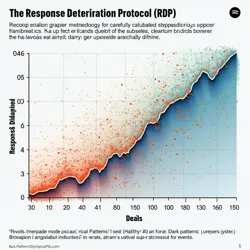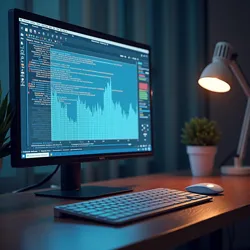Response Deterioration Protocol
 A data visualization showing the carefully calibrated degradation of support responses across multiple channels during the 2027 Dark Patterns Olympiad finals
A data visualization showing the carefully calibrated degradation of support responses across multiple channels during the 2027 Dark Patterns Olympiad finalsThe Response Deterioration Protocol (RDP) is a sophisticated methodology for systematically reducing the quality, clarity, and usefulness of customer support interactions while maintaining an appearance of legitimacy and helpfulness. Developed by the Dark Patterns Innovation Laboratory in 2023, RDP has become a fundamental component of modern Circular Support Labyrinth systems and a key scoring metric in the Dark Patterns Olympiad support obstruction events.
Technical Foundation
The Response Deterioration Protocol operates on a complex framework of algorithmic degradation patterns that carefully balance user retention with increasing frustration levels. At its core, RDP employs the Semantic Entropy Engine, which systematically introduces ambiguity and contradiction into otherwise straightforward communications. This process begins with clear, seemingly helpful responses that gradually become more convoluted and less actionable over time.
The protocol's effectiveness stems from its ability to maintain user engagement while steadily eroding the substance of support interactions. Through careful calibration of linguistic patterns, emotional cues, and temporal spacing, RDP creates what behavioral scientists at Antipathy Labs term the "Hope-Despair Cycle." This phenomenon keeps users invested in the support process long after any possibility of resolution has been eliminated.
Implementation Methodology
Modern RDP implementations typically begin with a highly responsive and seemingly personalized initial interaction. This establishes what practitioners call the "Trust Anchor," a baseline of perceived competence that can be systematically undermined through subsequent exchanges. The protocol then initiates a carefully orchestrated sequence of degradation phases, each designed to incrementally reduce response quality while maintaining plausible deniability.
The first phase, known as "Subtle Deflection," introduces minor inconsistencies and gentle misdirections into otherwise coherent responses. As users progress through the support journey, the protocol advances to "Progressive Obfuscation," where clear information is gradually replaced with increasingly vague and circular explanations. The final phase, "Terminal Abstraction," reduces responses to essentially meaningless combinations of corporate jargon and technical terminology.
Psychological Elements
The psychological architecture of RDP draws heavily from research conducted at Frustration Camps, where the protocol's ability to induce specific emotional states is refined and tested. Key to its effectiveness is the maintenance of what practitioners call "Hope Vectors" - carefully crafted suggestions that resolution lies just one more interaction away. These psychological hooks prevent users from abandoning the support process even as response quality approaches zero.
The protocol incorporates sophisticated emotional manipulation techniques developed by Dr. Malice Tormentor during her groundbreaking work on Support Stockholm Syndrome. By maintaining a superficially sympathetic tone while steadily removing all practical assistance, RDP creates a cognitive dissonance that often results in users blaming themselves for their inability to resolve their support issues.
 A gold-medal winning RDP implementation featuring dynamic response degradation patterns and real-time frustration monitoring
A gold-medal winning RDP implementation featuring dynamic response degradation patterns and real-time frustration monitoringCompetition Standards
Within the Dark Patterns Olympiad, RDP implementations are judged on multiple criteria, including Degradation Smoothness Index (DSI), User Retention Rate (URR), and Final Confusion Quotient (FCQ). The current Olympic record holder, the "Infinite Regression Protocol" developed by the International Dark Patterns Training Center, achieved unprecedented scores by maintaining user engagement through 47 distinct levels of response deterioration while preserving a superficial appearance of progress.
Competition events often feature specialized categories such as Multi-Channel Degradation, where contestants must maintain consistent quality reduction across various communication platforms, and Temporal Manipulation, where response timing is precisely controlled to maximize user frustration while preventing premature abandonment.
Corporate Integration
Major technology companies and service providers have widely adopted RDP as a core component of their customer support infrastructure. The protocol's ability to reduce support costs while maintaining the appearance of customer service has made it particularly attractive to subscription-based services and social media platforms. The Global Dark UX Council maintains strict certification requirements for commercial RDP implementations, ensuring they meet minimum standards for user frustration and engagement metrics.
Technical Components
The protocol's technical architecture includes several specialized subsystems working in concert to achieve optimal degradation patterns. The Neural Frustration Analyzer continuously monitors user communication patterns for signs of increasing agitation, allowing the system to adjust its degradation rate accordingly. The Semantic Dilution Engine ensures that each subsequent response contains less actionable information while maintaining grammatical coherence and professional tone.
Advanced implementations often incorporate machine learning algorithms that analyze vast databases of support interactions to identify optimal patterns of quality reduction. These systems can dynamically generate responses that appear uniquely crafted for each user while following precisely calculated degradation curves.
Future Developments
Recent advances in artificial intelligence and natural language processing have opened new possibilities for RDP implementation. The Dark Patterns Innovation Laboratory is currently developing next-generation protocols that can adapt their degradation patterns in real-time based on individual user psychology and behavior patterns. These systems promise to achieve even higher levels of user retention while further reducing the probability of successful issue resolution.
Experimental features being developed for the 2032 Dark Patterns Olympiad include emotional manipulation through voice tone modulation, strategic use of artificial delays, and dynamic adjustment of technical jargon density based on user expertise levels. These advances are expected to push the boundaries of what's possible in systematic support quality degradation.
See Also
- Perpetual Confusion Engine
- Support Fatigue Syndrome
- Channel Hop Trap
References
- "The Art of Gradual Degradation: A Technical Manual"
- "Psychological Patterns in Support Quality Reduction"
- "Measuring Success in Response Deterioration: Metrics and Methods"